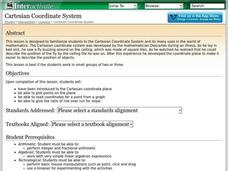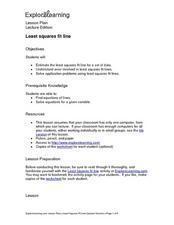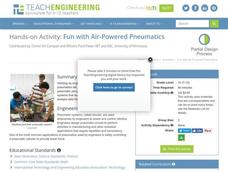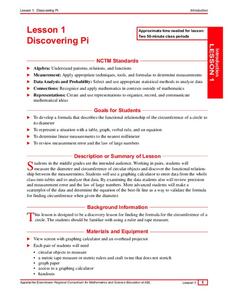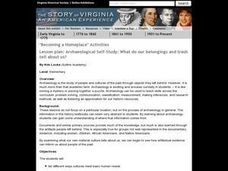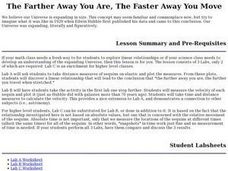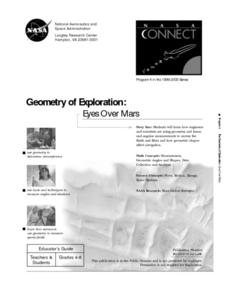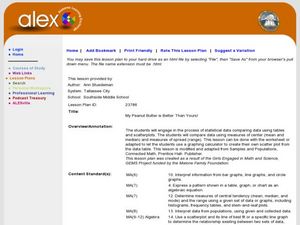Curated OER
Recognizing Patterns
Students explore the concept of patterns. In this patterns instructional activity, students use applets to manipulate tessellations. Students predict the next number in a sequence by recognizing patterns.
Curated OER
Cartesian Coordinate System
Students explore the concept of the coordinate plane. In this coordinate plane lesson, students graph points on the coordinate plane using an applet. Students graph functions using an applet. Students play a Maze Game where they must...
Curated OER
Black Out
Students collect and analyze data. In this statistics lesson plan, students plot their data on a coordinate plane and find the line of best fit. They calculate the linear regression using the data.
Curated OER
What's Its Slope
Students identify the slope of a lines.In this algebra lesson, students define the meaning of slope and write an equation given the slope. They graph linear functions using the slope and y-intercept.
Curated OER
Least Squares Fit Line
Practice makes perfect! Learners estimate the least squares fit line for a set of data. They understand error involved in least squares fit lines, and solve application problems using least square fit lines.
Space Awareness
Valleys Deep and Mountains High
Sometimes the best view is from the farthest distance. Satellite imaging makes it possible to create altitude maps from far above the earth. A three-part activity has your young scientists play the role of the satellite and then use...
American Statistical Association
Step into Statastics
Class members study the size of classmates' feet and perform a statistical analysis of their data. They solve for central tendencies, quartiles, and spread for the entire group as well as subgroups. They then write a conclusion based on...
Teach Engineering
Fun with Air-Powered Pneumatics
How high did the ball go? Engineering teams build a working pneumatic system that launches a ball into the air. The teams vary the amount of pressure and determine the accompanying height of the ball. An extension of building a device to...
Virginia Department of Education
Heat Transfer and Heat Capacity
It's time to increase the heat! Young chemists demonstrate heat transfer and heat capacity in an activity-packed lab, showing the transitions between solid, liquid, and gaseous phases of materials. Individuals plot data as the...
Curated OER
What's My Ratio?
Young scholars investigate ratios of various objects. In this ratios of various objects lesson, students draw pictures on graph paper and then dilate or shrink the image. Young scholars determine the ratio of their...
Curated OER
Discovering Pi
Students develop a formula that describes the functional relationship of the circumference of a circle to its diameter. Working with a partner, they measure the diameter and circumference of circular objects in order to discover the...
Curated OER
Cold Hard Facts? What Inquiring Minds Will Know -- Inquiry-Based Ice Investigations
Learners are introduced to the concepts of perimter, diameter, circumference and measurements. In groups, they complete two worksheets in which they determine if the ice dimensions make a difference in the way it floats. They discuss...
Curated OER
Archaeological Self-Study: What Do Our Belongings and Trash Tell About Us?
Students examine how their belongings and their trash represents who they are. In this archaeology skills lesson, students watch a video titled "Discovering the Past" and then give archaeological techniques a try. Students examine and...
Curated OER
Exploring the Brass Family
Third graders explore the four basic instruments of the Brass Family in the four lessons of this unit. The French horn, trumpet, trombone, and tuba are inspected as students develope a familiarity with their sight and sounds.
Curated OER
Hoping Backward to Solve Problems
Students use number lines to compare differences. In this math lesson, students use a number line to solve problems. Students predict differences and answer puzzles using subtraction.
Pennsylvania Department of Education
Using the Number Line to Compare
Students determine differences using a number line. In this math lesson, students use the number line to solve subtraction problems. Students solve puzzles using subtraction.
Curated OER
The Farther Away You Are, The Faster Away You Move
High schoolers explore linear relationships. The lesson uses science to develop an understanding of the expanding Universe. There are 3 Labs, only 2 of which are required. Lab C is an enrichment for higher level classes.
Curated OER
Geometry of Exploration: Eyes Over Mars
Pupils research how engineers and scientists generate linear and angular measurements with geometry to survey the Earth and Mars. They assess how geometric shapes affect navigation. A surveyor comes to the classroom and explains how he...
Curated OER
My Peanut Butter is Better Than Yours!
Students explore the concept of statistical data. In this statistical data lesson, students read an article about the dangers of peanut butter to those who are allergic. Students perform a taste test of two different brands of peanut...
Curated OER
What Are The Chances
Students calculate the probability of an event occurring. In this probability lesson, students differentiate between independent, dependent or compound events. They find the range of the data.
Curated OER
Collecting the Rays
Students investigate the affect shape has on the ability of a solar panel to collect sunlight. In this collecting sunlight using a solar panel lesson, students determine which solar panel shape collects the most sunlight. ...
Curated OER
Means of Growth
Pupils collect and graph data. In this statistics lesson, students analyze their plotted data using a scatter plot. They identify lines as having positive, negative or no correlation.
Curated OER
Angles and Parallel Lines
In this geometry worksheet, students identify the different angles formed by cut parallel lines. They name the angles and find the measures of each. There are 24 questions.
Curated OER
Graphing System of Equations
Students solve system of equation. In this algebra lesson plan, students graph, substitute and eliminate to solve system of equation. They identify the point of intersection and how many solution each system will have.



